PACS news / January 14, 2021
DCSL Names Practitioner Fellows 2021-22
The new cohort of 14 Practitioner Fellows joins Digital Civil Society Lab
The Digital Civil Society Lab (DCSL) and Center for Comparative Studies in Race and Ethnicity (CCSRE) are pleased to announce the 2021 cohort of practitioner fellows which comprises of 14 exceptional social sector leaders working on ideas to benefit civil society. This year’s fellows are working on a range of topics and tools in the realm of digital civil engagement that will help protect civil society actors and advance racial justice.

Tara L. Conley is an interdisciplinary Black feminist scholar, media-maker, writer, and assistant professor in the School of Communication and Media at Montclair State University.
What is your research focus?
Key areas of scholarly and creative inquiry, and multimedia production include: cultural histories of media and technology (discourse, perceptions, and infrastructures); archiving digital cultures; critical transmedia storytelling; and the everyday lives of Black people in the study and exploration of place, media histories, and technoculture.
How do you plan to change the world?
By thinking locally and prioritizing the needs and sustainability of communities that matter most to me.
Learn more about Tara here.
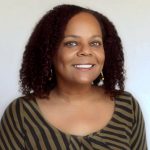
Venita Griffin serves as the digital director for a national nonprofit that trains and supports Black, Indigenous, People of Color (BIPOC) community organizers, elected officials, and advocates.
What is your research focus?
Identifying and countering racial and economic bias in digital civic engagement tools and tactics.
How do you plan to change the world?
I want to impact change by arming organizers and organizations with the information they need to conquer emerging technology.
Learn more about Venita here.

Jazmia Henry is a Machine Learning Specialist at Motley Fool. She seeks to reduce racial and gender bias in sentiment and textual analysis systems through the creation of an African American Vernacular English corpus.
What is your research focus?
Natural Language Processing: Reducing Bias in Sentiment Analysis Systems.
How do you plan to change the world?
I seek to quantify the historically unquantifiable through machine learning. Our technological and mathematical advancements have given us the ability to quantify the experiences of marginalized groups. By creating an AAVE corpus for public use, we can improve large-scale sentiment systems that have traditionally shown racial and gender bias.
Learn more about Jazmia here.
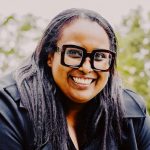
Sabrina Hersi Issa is a human rights technologist and angel investor committed to leveraging innovation as a tool to unlock opportunity and dignity for all. She does this through her work in technology, media, and investments. Sabrina leads Be Bold Media, and is an opinion contributor for NBC News on technology, power, and human potential.
What is your research focus?
Policy recommendations to address the intersectional impacts of COVID on communities of color.
How do you plan to change the world?
I am building a world where we all get to thrive.
Read more about Sabrina here.
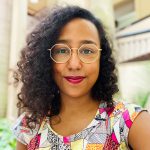
Neema Iyer is an artist and a technologist. She is the founder and director of Pollicy, a civic technology organization based in Kampala, Uganda.
What is your research focus?
The intersection of data, design and technology through a feminist lens.
How do you plan to change the world?
By infusing art and creativity into how we design the services and products that we rely on.
Read more about Neema here.

Burcu Kilic is a scholar, lawyer and digital rights advocate. She directs the Digital Rights Program at Public Citizen, a consumer advocacy organization based in Washington D.C. that champions public interest in the halls of power.
What is your research focus?
Digital trade, digital rights, social justice, technological and economic development.
How do you plan to change the world?
I plan to change the world by standing up to power, questioning the status quo, advocating against social and economic injustice, and inspiring new policy directions.
Read more about Burcu here.
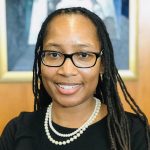
Brandeis Marshall is an education activist, scholar, and data justice advocate. She is the CEO of DataedX, a talent development firm advancing the data science capabilities of the everyday professional, and co-leads BeyondOne, a data learning community for Black women.
What is your research focus?
Data+AI ethics, data education, data equity practice, data talent development.
How do you plan to change the world?
To democratize culturally responsive data instruction and empower all with that data understanding.
Read more about Brandeis here.
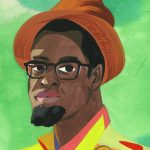
Sabelo Mhlambi is a founder at Bantucracy and his work focuses on Decolonial AI and the use of African Indigenous Philosophy in shaping Ethical AI Policy and the production of Ethical AI in Sub-Saharan Africa.
What is your research focus?
Ethical AI Frameworks + Ethical AI.
How do you plan to change the world?
Through selfless service.
Read more about Sabelo here.
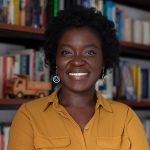
Nanjala Nyabola is an independent writer and researcher based in Nairobi, Kenya. She is the author of Digital Democracy, Analogue Politics: How the Internet Era is Transforming Politics in Kenya (Zed Books, 2018), and Travelling While Black: Essays Inspired by a Life on the Move (Hurst Books, 2020).
What is your research focus?
I write, research and think about the intersection of technology, politics and society.
How do you plan to change the world?
One step at a time.
Read more about Nanjala here.
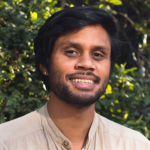
Shakeer Rahman is a lawyer and community organizer with the Stop LAPD Spying Coalition. Shakeer has written about policing and prisons in the Harvard Law Review, the New York Times, Al Jazeera America, Dissent Magazine, the London Review of Books, and Counterpunch.
What is your research focus?
Prison abolition, surveillance, decolonization, counter-insurgency.
How do you plan to change the world?
I want to help build communities where policing, surveillance, and incarceration are unimaginable.
Read more about Shakeer here.
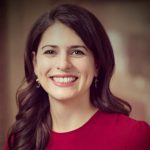
Elizabeth M. Renieris is the Founder & CEO of HACKYLAWYER, a Technology and Human Rights Fellow at the Carr Center for Human Rights Policy at Harvard’s Kennedy School of Government, and an Affiliate at the Berkman Klein Center for Internet and Society. Her work is focused on data governance, digital identity, and the risks posed by blockchain and other emerging technologies.
What is your research focus?
The civil and human rights implications of digital identity systems; preventing enclosure of the digital public sphere via privatized digital identity solutions.
How do you plan to change the world?
By challenging the assumptions that gave rise to the likes of Mark Zuckerberg.
Read more about Elizabeth here.
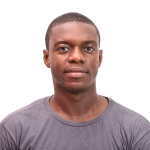
David Selassie Opoku is a farmer and technologist from Ghana working at the intersection of food systems, technology, and education. He is currently the co-founder and Director of Technology at Growing Gold Farms, a food systems venture based in Tema, Ghana.
What is your research focus?
Democratizing Knowledge and Innovation in Smallholder Farming.
How do you plan to change the world?
Build a distributed community and infrastructure that enables a generation of smart, creative and expert food actors who can replicate and scale sustainable (physiological, social/communal, economic, spiritual and environmental) and accessible food production processes and systems.
Read more about David here.
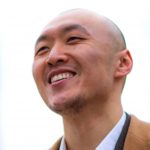
Joshua Tan is a mathematician and computer scientist at the University of Oxford. He’s currently working on a governance layer for the Internet as part of the Metagovernance Project.
What is your research focus?
Governance, math, AI.
How do you plan to change the world?
“There is another world, but it is in this one.” – Yeats
What is an interesting fact about yourself?
I originally studied art history.
What is music/film/art that represents who you are?
“Human”, by The Killers.
Read more about Joshua here.

Dr. Kortney Ziegler is an award-winning entrepreneur who has built a number of solution-driven products focused on providing support for the Black diaspora. He is currently working on helping others learn and understand the cryptocurrency market through the educational platform Green Kandle Academy.
What is your research focus?
Technology; Crypto; Finance.
How do you plan to change the world?
By creating tech that improves the lives of vulnerable individuals.
Read more about Kortney here.
